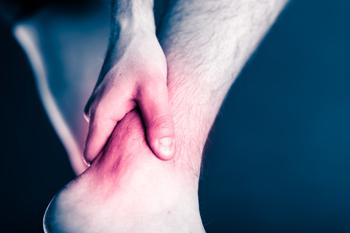Glen Allen Office
(804) 747-3380

Achilles tendinopathy is a common foot and ankle issue caused by overuse of the Achilles tendon. It can be classified into two types, which are insertional, where the tendon attaches to the heel, and non-insertional, which impacts the middle portion of the tendon. While both cause pain, swelling, and stiffness, insertional tendinopathy often involves discomfort at the back of the heel, while non-insertional pain is felt higher up along the tendon. If left untreated, the tendon can go through non-healing stages known as reactive tendinopathy, or early swelling and pain, tendon disrepair, and degenerative tendinopathy, causing long-term damage with thickening and weakness. Proper treatment includes rest, targeted exercises, and addressing any biomechanical issues. If you are experiencing persistent pain in your Achilles tendon, it is suggested that you see a podiatrist for an accurate diagnosis and an effective treatment plan.
Achilles tendon injuries need immediate attention to avoid future complications. If you have any concerns, contact one of our podiatrists of The Podiatry Center. Our doctors can provide the care you need to keep you pain-free and on your feet.
What Is the Achilles Tendon?
The Achilles tendon is a tendon that connects the lower leg muscles and calf to the heel of the foot. It is the strongest tendon in the human body and is essential for making movement possible. Because this tendon is such an integral part of the body, any injuries to it can create immense difficulties and should immediately be presented to a doctor.
What Are the Symptoms of an Achilles Tendon Injury?
There are various types of injuries that can affect the Achilles tendon. The two most common injuries are Achilles tendinitis and ruptures of the tendon.
Achilles Tendinitis Symptoms
Rupture Symptoms
Treatment and Prevention
Achilles tendon injuries are diagnosed by a thorough physical evaluation, which can include an MRI. Treatment involves rest, physical therapy, and in some cases, surgery. However, various preventative measures can be taken to avoid these injuries, such as:
If you have any questions please feel free to contact one of our offices located in Richmond and Glen Allen, VA . We offer the newest diagnostic tools and technology to treat your foot and ankle needs.